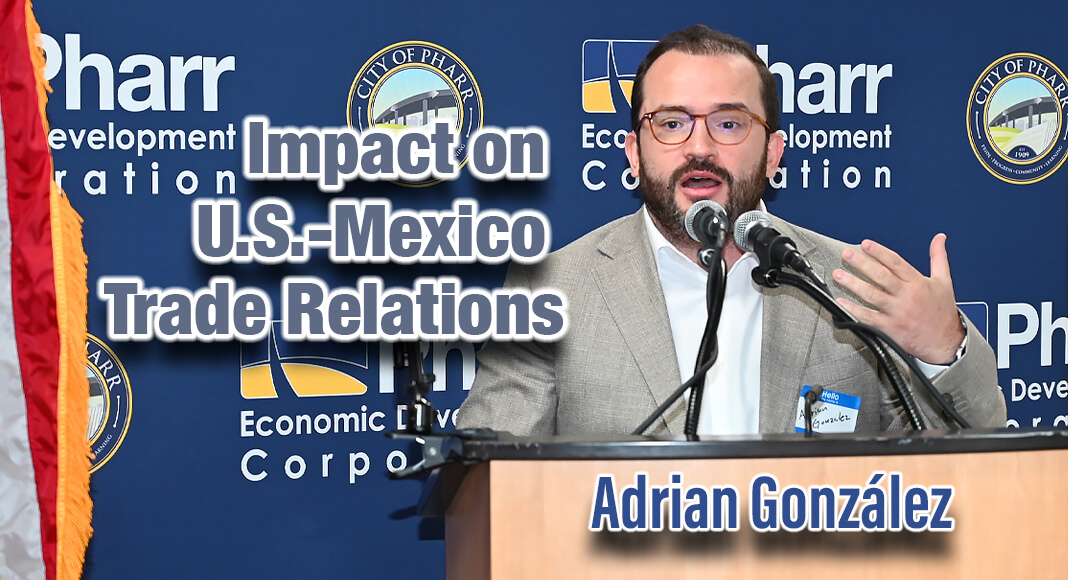
Texas Border Business
By Roberto Hugo González
The concept of nearshoring, moving business operations to nearby countries, is fast becoming a critical component of modern global trade, geopolitics, and government policy. Initially triggered by the U.S. Customs Broker Adrian González’s presentation during Pharr’s Industrial and Investment Tour. He said the increasing focus on this trend cannot be understated, especially in the dynamic landscape of U.S.-Mexico trade relations.
Adrian pointed out that traditionally, offshoring had been the go-to strategy for many companies, particularly in the United States, seeking to capitalize on the lower labor and production costs in far-off countries like China. However, as supply chain complexities increase and geopolitical tensions rise, nearshoring is emerging as a new model, aimed at making supply chains more resilient and reducing dependencies on distant nations.
The shift towards nearshoring comes with a multitude of advantages. Closer geographical proximity allows for faster delivery times, significantly lowering logistics costs. With reduced shipping distances, the carbon footprint also shrinks, aligning with growing corporate social responsibility towards environmental sustainability. Moreover, having operations in a nearby country offers easier coordination due to time zone similarities and cultural affinity. Companies also find it easier to comply with local regulations, avoiding potential legal pitfalls that could arise in different judicial environments.
Adrian said that México stands out as an ideal nearshoring partner for U.S. companies in this ever-changing landscape. “The country offers a range of benefits from its close physical distance to the U.S. to a skilled workforce available at competitive costs.” He continued, “México also has free trade agreements in place, most notably the United States-México-Canada Agreement (USMCA), which further facilitates market access and regional integration.”
“However,” he said, “it’s not just about the advantages for business operations; the geopolitical implications are profound. With the U.S. keen on reducing its dependency on China amidst rising tensions, nearshoring becomes a strategic maneuver.”
He noted that this policy direction is evident through various legislative actions by the U.S. government. The Infrastructure Investment and Jobs Act allocates over $400 billion to improve infrastructure, while the Inflation Reduction Act invests $370 billion into clean energy and electric vehicles. The CHIPS Act also aims to bring semiconductor manufacturing back to U.S. soil with more than $70 billion in funding.
He continued to say that global shifts in trade policy, spurred by the U.S. posture on nearshoring, are also encouraging other countries to reconsider their positions. “Vietnam, Taiwan, and India are gaining significance in the global trade scenario, each for their unique offerings that align with the goals of reducing reliance on China and enhancing supply chain resilience,” he stated.
Adrian highlighted that a shared commitment to human and labor rights reinforces U.S.-Mexico relations. Recent pressures from the U.S. have led Mexico to revise its labor policies, especially around collective bargaining, to align more with American values. This shift has also triggered a change in corporate consciousness, extending beyond the sole consideration of minimum wage to wider labor rights and ethical considerations, such as forced labor and human rights abuses.
He explains that while nearshoring opens doors to unprecedented opportunities, it’s not without its challenges. The infrastructure, particularly at border facilities, requires improvements to speed up customs checks. Trade facilitation to simplify cross-border commerce and ongoing controversies in sectors like energy and biotechnology are other hurdles that require attention.
To navigate this complex landscape effectively, Adrian recommends investing in infrastructure, enhancing supply chain transparency, and facilitating bi-national discussions to resolve remaining issues. His insights underline the need for government and private sector strategic actions.
In conclusion, the growing trend of nearshoring presents a paradigm shift in international business, driven by a complex blend of economic benefits, geopolitical implications, and government policies. The U.S. and Mexico, strengthened by initiatives like the USMCA, are stepping up as prominent players in this evolving narrative. While challenges remain, the alignment in policy initiatives suggests a promising future for trade and investment, making nearshoring a strategic focus that is likely here to stay.
Adrian González was also a speaker at the recent “1st Business Summit” presented by Pharr Economic Development Corp. (PEDC) in Monterrey, Nuevo Leon in México. This initiative was led by President and CEO of the Pharr EDC, Victor Pérez. The summit aimed to promote Pharr’s investment attractiveness and capitalize on the emerging nearshoring opportunities on July 6, 2023. This international summit recognized Mexico as a crucial trading partner and strategically proximate to Pharr, Texas.















